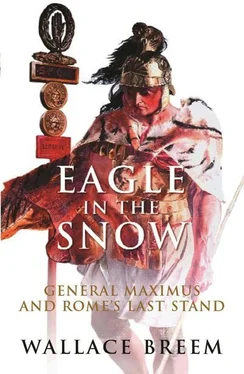We had other news later. A horse trader on his way to Petriana told me that a Vandal general in the service of the empire had been named guardian to Honorius, and that this general—Stilicho—was looked upon as the one man who might yet be the saving of Rome. He had driven the Franks and the Alemanni back into Germania and had secured the Rhenus frontier once more.
That winter it was bitterly cold and we had difficulty over fuel. By the shortest day the stock of black stones that we kept in the old guard-room by the blocked-up eastern gate had run low, and it was hard to chip out a fresh supply from the ice-bound outcrop we had worked for years. Aelia developed a bad cough that grew worse instead of better. Even when packed in blankets by the meagre fire in our quarters she did not cease shivering, and the sight of her face, with its sunken eyes, made us all afraid. I would have sent her south but the roads were impassable and in any case, as Saturninus said afterwards, she would not have left us. Quintus was a good friend at that time. He would ride over and sit beside her on those occasions when my duties took me from the fort; and he did much to cheer her up. I kept on saying to myself that when the spring comes she will be well again. Each night and each morning I prayed to Mithras, and I prayed to her god as well. He at least should have heard me. Her god cared for the weak and the sick, she used to say, but he did not help her now, and when the spring came at last, she died.
That summer I went down to Eburacum and asked for a transfer. Constantinus was chief of staff now; an ambitious middle-aged man who had shared a hut with me in my legionary days with the Twentieth. He had a son, Constans, in command of an ala. Him, I did not like. He was contemptuous, cruel and conceited, and had too much of a following among the younger officers.
I spent my time either waiting in the empty ante-rooms of the repaired headquarters of the Sixth, or walking through the neglected streets. Sometimes I would sit in the empty amphitheatre and try not to think of my wife…. He had come out of that gate there, leading the rear of the procession, while the legate of the Sixth had smiled at his daughter and the sun beat down on the sweating crowds. Down there in that smooth circle of sand the two tiny figures had swayed and darted, until one was dead and the other stood motionless, while the packed seats roared, awaiting the hollow gift of a freedom he could do nothing with. The legate could make him free, but he was a prisoner of his thoughts for ever.
Then in a wine-shop one evening, I heard through the smoke, the chatter and the click of dice, the bored voice of the young Constans. “Someone should tell the old fool he’s wasting his time. It’s more than my father’s job is worth to give promotion to a pagan.” I got to my feet and crossed to the counter where a girl was taking dirty wine cups off a tray. “Give me that,” I said. I picked up the tray, rubbed it with my sleeve and held it up to the light. In the reflection I could just see my face. I looked at the polished bronze in silence; then I turned and went out. The next morning I collected my horse from the cavalry stables and returned to Borcovicum. I had accomplished nothing.
Later we heard that the Guardian of Rome had landed at Dubris. He was paying a visit, so it was said, to re-organise our defences. When we heard that he was coming north to Eburacum Quintus, whom I had not seen for weeks, rode in to tell me that he was going down to see Stilicho.
“You are wasting your time.” I looked at his tired face impatiently. “He needs young men, not their ghosts.”
“Perhaps. But he may need soldiers of experience who did their training in a proper legion. Maximus, we have rotted here long enough.” His voice sounded desperate.
“Enjoy yourself,” I said. “And bring back some wine. Try his staff for Mosella. I am sick of drinking vinegar.”
A week later he returned, but he was not alone. A cavalry detachment was behind him and in front a group of horsemen surrounding a scarlet cloak, gilded armour and a great horse-hair plume that over-topped them all.
I ordered the trumpeter to sound the “alert” and my men fell in outside the south wall. Stilicho, the military master of the Western Empire, was a big man, with broad shoulders, blond hair and restless blue eyes. He inspected everything. He saw the record room that had become an armoury, the adjutant’s office, now used for making arrow heads, and the accounts room in which the paymaster slept as well as worked. He visited the quarry where we dug the stones to repair the walls, and always he asked questions. He never stopped asking questions.
“How old are you? And how long have you been on the Wall?” he asked. I told him and he paused a moment and then said, abruptly, “I have heard how you defied your name-sake and lived. I have heard also how you commanded the Sixth Legion in retreat. What would you say if I told you I may have to withdraw a legion to help me in Italia?”
“If the general needs the legion then that legion is indeed needed,” I replied, carefully.
He said, “We cannot any longer fight the barbarians in the old way. In the days of the legion it was possible. Your armoured soldier was the finest in the world. But not after Adrianopolis. Valens died, but if he had lived he would never have known why he was beaten. But I know.” He smiled. “I am a barbarian myself. Can you tell me why they were beaten?”
I was silent.
“Come. It was not a question of numbers or bad leadership, though both played their part.”
“The legionaries had beaten cavalry before,” I said slowly. I was thinking of what I had read about Maharbal, Hannibal’s great cavalry commander.
“Yes,” he said. “But they had never fought cavalry who used stirrups.”
I thought for a moment. “You mean the stirrups gave them some kind of extra stability to make better use of their weapons,” I said, hesitantly.
“That’s right,” he said. “Your friend, Veronius, said you could still think like a soldier and he was right.”
“But the Sarmatians used stirrups too,” I said.
“They did, but they used their horses for skirmishes, raids and ambushes. They never charged, shoulder to shoulder, in a mass. No man on foot can stand up against that.”
I was silent. I was interested but I could not see where this was leading.
He said, “The Sixth must stay at Eburacum as a mobile force in case your heather catches fire again. The Second must stay at Rutupiae to guard the Saxon Shore. That leaves the Twentieth. They are below strength, badly led and under-paid. They have little discipline and no fighting skill. You will take over as their general. Call yourself legate in the old style if you wish. Keep the name of legion and keep the Eagle too, if it is of help. Organise them how you will. Appoint your own officers. But forget the battle drill they taught you in the old legion. You will need bows not javelins now. What I want is a field force of six thousand men, part horse, part infantry, trained and disciplined to fight masses of cavalry in the open, one moment, or build and man a line of forts the next.”
His eyes were on me and I could not look away. “How long will you give me?” I asked. I could hardly take in what he was saying.
“Be ready in a year and expect my summons after that.” He handed me a parchment. “Here is a commission, signed by the Emperor. The name has not been filled in, but I will do that before we eat.”
I said, “Does the Emperor know that I am not a christian?”
“Oh, yes. Why else do you think a man of your ability has stayed up here all these years?”
“But did he not mind, sir?”
Stilicho smiled. “I persuaded him to bend his own laws a little.”
Читать дальше












